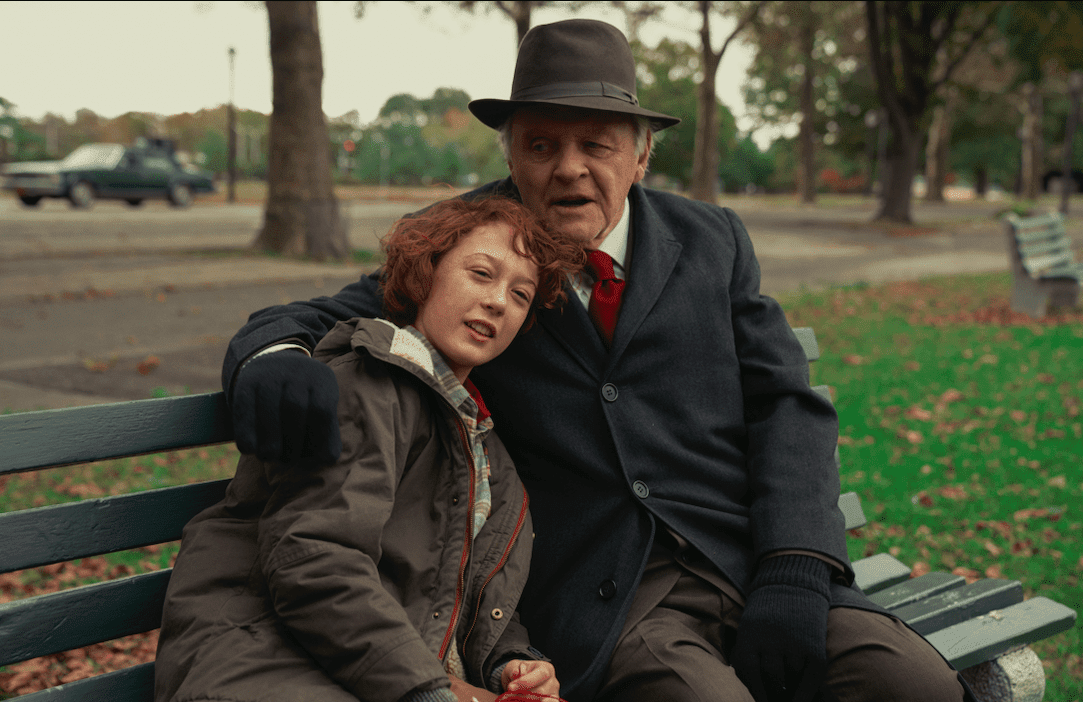
Armageddon Time got me thinking about the story of David and Goliath and how it registered in Sunday school. It was taught as a story of humility, but, in hindsight, it really feels like a power fantasy. It told kids they don’t need big muscles to be powerful and that they only need a small rock to be powerful, blissfully unaware they were telling us we need to be powerful.
Maryanne Trump (Jessica Chastain in a brief but crucial scene) gives a speech at a school assembly. While she dishonestly rambles about how hard work got her where she is; she also talks about being a woman trying to make it in a man’s world, and she blissfully reinforces a similar pre-supposition. In saying it’s a man’s world, she acknowledged the misogyny that stood in her way, but by insisting she overcame it and that you can too, the misogyny that comes with the system doesn’t have to stop the girls in front of her from achieving that power — they can fight the system to join the system.
What’s a kid to do in the face of the system? This is the question confronting Armageddon Time’s Paul Graff (Banks Repeta). He starts the movie embracing it. When his newfound friend Johnny Davis (Jaylin Webb) says he can’t afford the fee for a field trip, Paul offers his parent’s money. When Paul is unhappy with Mr. Turkeltaub (Andrew Paul), their racist jackass of a teacher that singles out Johnny (Johnny’s black), Paul believes his mother Esther (Anne Hathaway) can have him shaking in his boots, because she’s the president of the PTA.
The closer Paul gets with Johnny, the more rebellious he gets. They both have fun being little rebels, but in Johnny’s case, his little rebellion is a form of survival. He’s in the 6th grade and stuck in a never-ending cycle. Johnny makes a joke, Turkeltaub sends him to the principal’s office. When Johnny comes back, he asks for the necessary materials to catch up on the lesson, only for Turkeltaub to say “you’re not gonna catch up” and tells him to do some classroom chores. Turkeltaub punishes Johnny for not being educated and then refuses to educate Johnny because he was punished. Following this, Johnny offers Paul a joint an older kid gave him. He earnestly tells Paul that you smoke it and it “makes you laugh a lot.” It’s an earnest curiosity for a kid stuck in a cycle of punishment for laughing. Alas, they’re caught with their earnest curiosity, leading to violent rage from Paul’s father Irving (Jeremy Strong).
Irving is an insecure man, trying to insist autonomy is possible within his confines. In an earlier scene, he tries waking up Paul for school in a fun way, singing loudly and in a silly manner. When this doesn’t work, the real Irving comes out. He doesn’t beat him, he just drops the silly tone and gets annoyed very quickly. And if he’s annoyed over something as simple as his son not being 100% awake, he becomes a monster when he finds out about Paul smoking weed. Paul locks the bathroom door and hides in the bath, with the film cutting between a tight handheld closeup of Paul and a terrifyingly stable shot of the locked door. Muffled offscreen dialogue between Esther and Irving escalates to unfathomable noise from Irving, followed by aggressive slams against the door. The stable shot is undone when he busts through the door and grabs his belt.
It’s like a scene out of a horror movie, and this horror is cemented by Esther’s own reaction to it. She’s clearly upset, but not at the horrible violence Irving just inflicted on a child, but for the same reason Irving’s upset about the door, when he says “look at what you made me do to the door.” They dislike the method, but put the onus on the child.
Armageddon Time is not anti-discipline. When it’s decided Paul will go to a more disciplinary private school, he hopes his loving, gift-giving Grandpa Aaron (Anthony Hopkins) will be the voice of reason and talk his parents out of it. At a family dinner a few days later, he is surprised to learn it was Grandpa’s idea. It’s an initially upsetting scene, because it’s seen as a betrayal, as though Grandpa endorsed the violence Irving inflicted. A day or so later, when the two of them play in the park, Paul talks to his Grandpa about racial slurs his fellow students used to describe Johnny.
At this point, Grandpa’s history of escaping the holocaust, previously only mentioned, comes out. He draws a line in the sand, firmly distinguishing himself from the passive racism of Paul’s parents, and the system that perpetuates that passive racism. Grandpa’s rage is not for the sake of rage, or for the sake of power, nor is it directed at his Grandson, but at injustice itself. And for all his rage, Grandpa knows Paul is just a kid, and the scene ends with them firing a little rocket into the sky.
What’s a kid to do in the face of the system? Armageddon Time’s answer is: just let them be themselves.

